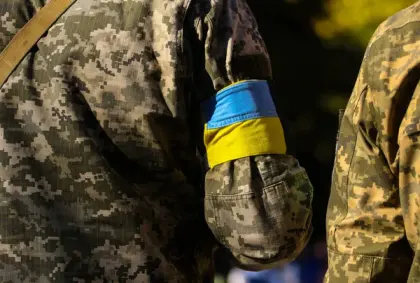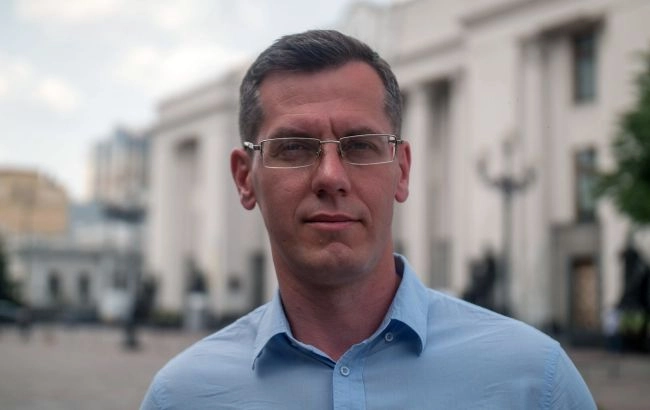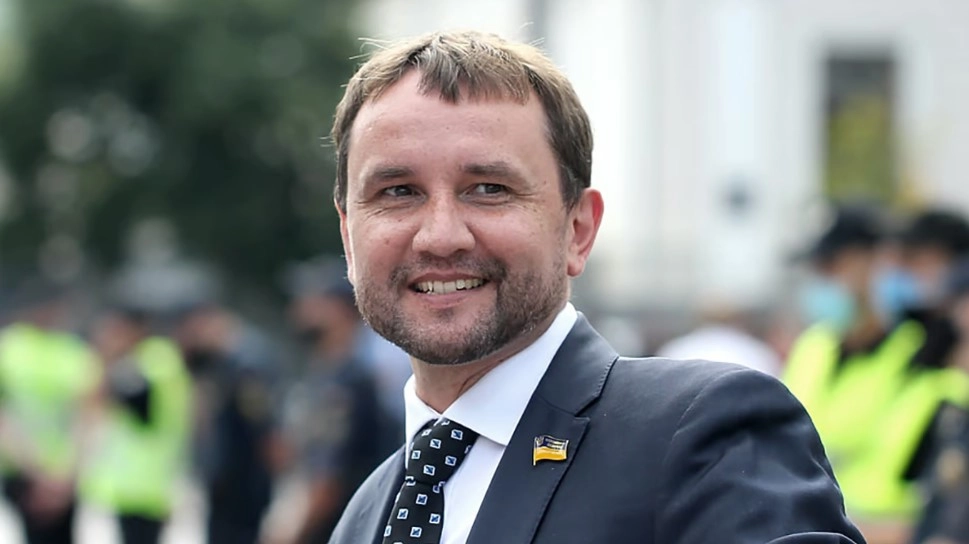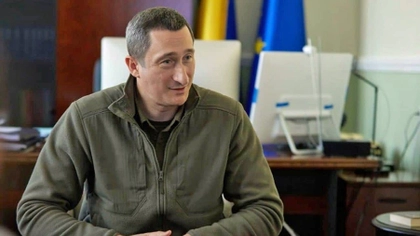Regarded as one of the most important pieces of legislation during the two years of full-scale war, the new law on mobilization was adopted by the Verkhovna Rada, Ukraine’s parliament, on April 11, with 283 of 351 lawmakers voting in favor; 1 voted against, 49 abstained and 18 did not vote. Of the yes votes 192 were from President Volodymyr Zelensky’s Servant of the People Party.
The bill was not supported by the opposition European Solidarity party, led by Petro Poroshenko. The majority of the Batkivshchyna party and part of the Holos party withheld support as well.
JOIN US ON TELEGRAM
Follow our coverage of the war on the @Kyivpost_official.
After three months of wrangling, most of the bill’s 4,300 amendments were rejected. In the days leading up to the vote, the most important amendment – the right to demobilization after a prescribed period of 36-months – was also rejected.
What does the law consist of?
In general, it is a framework law. It establishes the rules of mobilization and the level of responsibility for evading mobilization.
All men aged 18-60 years are required to update their status either at military enlistment offices or through online accounts.
The law abolishes conscription and instead introduces basic military training – five months during peacetime, and three months during war – to avoid cases of underprepared men being sent to the front as cannon fodder.
It also provides for military recruiting, so Ukrainians who want to join the ranks of the Armed Forces of Ukraine (AFU) will have the opportunity to choose the unit they will serve in, which should enable soldiers with special skills, such as IT or languages, to be put to better use.

Keeping Current With Shocking News, More POWs, Find the Ceasefire
“It’s good law… The state has finally created a system where a large number of people will be registered,” Serhii Kuzan, a former adviser to the Ministry of Defense and head of the Ukrainian Center for Security and Cooperation, told Kyiv Post.
According to him, the lack of a clear picture about how to mobilize reserves has led to excesses and brutality on the part of some Territorial Recruitment Center officials. “They didn’t have a clear picture, but they had clear plans, and they tried to fulfill them at all costs,” Kuzan said. “Hence the shameful videos of young men dragooned off the streets and thrown into a van.”
What about “draft-dodgers”?
At the same time, the law provides for a number of sanctions for “evaders,” which have been criticized. For example, Ukrainians abroad will not be issued a passport or receive consular services without military registration documents.
“It’s a shame because such coercive measures will not work; they only scare you away,” Volodymyr Viatrovych, a lawmaker from European Solidarity, told Kyiv Post. “This will not improve mobilization. On the contrary, it will force many to abandon the idea of returning to Ukraine after the war. This is wrong; we’ll need them when rebuilding the country.”
Another point that caused discussion is the punishment for evading mobilization. At first, there were proposals to make it a criminal offense. But in the end, lawmakers decided that evasion would be fined. Citizens violating the rules of military registration during martial law can receive a fine from Hr.17,000 to Hr.25,500 ($400 to $600), and enterprises or government officials from Hr.34,000 to Hr.59,500 ($900 to $1,500).
Yevhen Dykyi, a former commander in the Aidar battalion and now a military commentator, told Kyiv Post that a fine, as opposed to criminal punishment, is ineffective because it becomes a “payoff.”
Kuzan, however, disagrees. “I will say as a lawyer – it [criminal punishment] will not work. The courts will be flooded, and the whole system will stall. Finally, the task of the law is not to punish everyone. The problem is that everyone should be registered,” he said.
“The calculation is that we probably just won’t return from the war… And then they’ll say how they saved Ukraine in the parliament.”
Demobilization – the biggest sticking point – and who nixed it?
The most controversial issue in the new law is the absence of any demobilization after a specified time limit (except for disabled and former POWs). In Ukraine, during martial law, there is no legal mechanism for demobilizing troops.
Initially, lawmakers had worked out a compromise: the right to be demobilized after 36 months of service, of which 18 were in a zone of active military operations. But the day before the vote, the original version of the bill from the government was unexpectedly submitted to a committee.
“The provision on demobilization was still in the first reading [of the draft],” Viatrovych told Kyiv Post. “The committee supported the proposal for 36 months, but at the last moment everything turned around. This is absolutely the wrong approach. For three months, there was a lot of controversy and discussion in the committee, but in the end, everything returned to the original version. Why then lose three months? We could have voted for everything in January!”
Kyiv Post sources from the Servant of the People Party admit that the amendment on demobilization was rejected in recent days at the suggestion of the military. Ukrainska Pravda reported that Commander-in-Chief of the AFU, Gen. Oleksandr Syrsky, had insisted on this.
Syrsky, who took over in early February this year after Zelensky dismissed Gen. Valery Zaluzhny, inherited a crumbling defense of Avdiivka in his first days, which nearly turned into a rout due to a severe ammunition shortage. With US aid held hostage by pro-Trump Republicans, Syrsky will try to hold the line through the rest of the year and regroup for a potential offensive in spring 2025. Any demobilization after 36 months would deprive him of his most experienced soldiers at exactly the time when the spring mud dries up.
The front-line soldiers met Syrsky’s decision with deep disappointment.
“This is the law on lifetime mobilization,” one of the officers, who volunteered shortly after the full-scale invasion of 2022 and did not wish to be named, told Kyiv Post.
Another officer fighting in the East, who also preferred to be nameless, told Kyiv Post: “We were promised, you’ll get it, you’ll get it, you’ll get it. And then suddenly we realized it was a lie. The calculation is that we probably just won’t return from the war… And then they’ll say how they saved Ukraine in the parliament.”
Maksym Nesmiyanov, a soldier of the State Border Service of Ukraine and former executive director of the Union of Consumers of Ukraine, said that everyone in his unit was very disappointed.
“I’ve already lost my sense of fear. I have no freedom, no family, it’s virtual. My children write to me and ask, ‘When will you be back, Dad?’ And I hung on to the belief that one day, hypothetically, I’d return to them. Like a drug addict, I hung on to that hope. Now that’s gone, too. Just like for most of my guys,” Nesmiyanov told Kyiv Post.
“Nothing is clear about the United States. First, they promise help, and then they don’t deliver! The issue has been hanging in the air for six months.”
The ripple effect of American uncertainty
Why did everything change at the last moment? A Kyiv Post source close to the General Staff of the AFU of Ukraine said that the General Staff had really counted on demobilization options.
“It was indeed discussed; there were consultations. But when you are unsure about when help from the allies will arrive, or whether it will come at all, and when you only have norms for spending shells for one month in advance, the question arises: ‘Can we train the appropriate number of soldiers and officers to replace those who are being demobilized?’ First, they promise help, and then they don’t deliver! Nothing is clear about the United States; the issue has been hanging in the air for six months,” the source said.
At the same time, all those queried noted that the issue has not been entirely removed from the agenda. Rather, it has been compartmentalized and postponed. But when there is an opportunity, parliament will return to it and consider proposals to make a separate law on demobilization.
However, opposition lawmakers are skeptical. According to Viatrovych, the practice of excluding something inconvenient from the bill and promising to consider it separately is a common tactic. And it suggests that they have no intention of returning to it.
Yevgeny Dykyi believes that the issue of demobilization “was the only worthwhile and really important thing for the military that was in this bill; everything else is bureaucratic trifles.”
Despite the criticism, until Ukraine’s Western partners can guarantee the necessary materiel to fend off Russia, Kyiv will need all available personnel.
You can also highlight the text and press Ctrl + Enter














